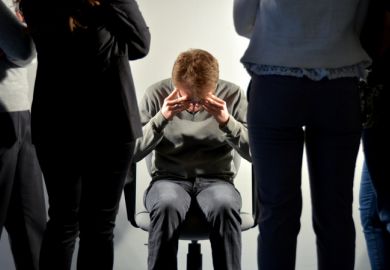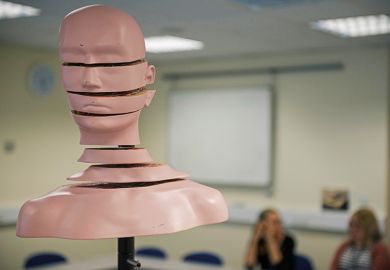The argument that students have become consumers of higher education will no longer raise eyebrows among readers of Times Higher Education. Equally uncontested is probably the point that students develop a greater sense of entitlement – that is, an expectation of academic success with less or no personal responsibility for achieving that success – as a result of embracing consumer attitudes.
These points are well rehearsed in the academic literature and in the pages of THE. Yet, there is another, less widely discussed angle to the story. I want to put forward the argument that students’ sense of entitlement (to graduate, for instance) may be growing as a result of the substantial (particularly, but not exclusively, international) fees that they pay.
If that is coupled with strong cultural and parental pressure to obtain a degree, this can lower students’ behavioural thresholds to such an extent that harassment and bullying are deemed legitimate tools to undo the violation of their entitlement expectation. Some readers will know only too well that this expectation can be thwarted, for instance, when students obtain marks that they dislike, or when academics report students for plagiarism or irregularities regarding ethics procedures.
There are known cases of students bullying academics because their expectations have not been fulfilled, but in comparison to news stories about academics or senior management bullying academics, cases of students bullying their lecturers have not yet received sufficient attention, in my view. This is problematic because disgruntled students can inflict psychological damage with incredible speed and surgical precision – for instance, through physical threats or the posting of malicious and defamatory comments on social media or via emails to staff and students.
For universities, in my view there are two challenges in the event of online bullying of academics by students. First, there must be an understanding what disciplinary and/or legal frameworks are in place not only to stop a student’s bullying behaviour, but to make them remove malicious postings from social media (especially if data are hosted on a server outside the jurisdiction of national law).
Realistically, how willing and serious are universities about applying these frameworks given their reliance on tuition fees as sources of revenue?
And second, what procedural avenues intended to protect staff from these low-level tactics are in place for academics to be able to exercise their job responsibilities without having to fear harassment from students? This is important, because in the absence of that protection and a safe working environment, those responsibilities could be compromised, for instance, if potential cases of plagiarism or breaches of ethics are not flagged up.
I am not suggesting that student bullying of academics is a huge problem (yet). But incidents have occurred, and one “freak accident” can destroy an academic’s well-being and reputation. If improperly handled by the university, it could also send the signal to other colleagues that they will not receive the necessary support when – having exercised their duties – they find themselves confronted with harassment and bullying by disgruntled students.
Consequently, what may have originally affected only a single academic can affect many more colleagues. This is likely to be exacerbated when university responses fail to contain the issue early and decisively.
So what can and should be done? The first step is to draw up codes of conduct for students, coupled with appropriate and well-defined disciplinary procedures. Most universities have these procedures in place, often under the label “dignity at work” policies, to ensure the safety and well-being of staff and students.
However, these policies will have little traction if universities lack the will to robustly and swiftly deal with cases of students bullying academics. Faint-hearted pleas to cease such activities are insufficient to instil a sense of safety in academics if these activities continue.
It will also be useful to gain a better empirical understanding of the frequency (and, where applicable, severity) of such cases to be able to inform not only university policies on disciplinary action and staff protection and well-being, but a general debate on how current HE funding models can influence student behaviour toward staff. To obtain this information, researchers and policymakers could use freedom of information queries.
Nobody gains anything if cases of students bullying academics are not deterred or dealt with when they occur. When such incidents happen, they are likely to indicate where universities place their priorities in terms of student satisfaction and staff protection and well-being.
Dirk Lindebaum is professor in organisation and management at Cardiff Business School.
POSTSCRIPT:
Print headline: Zero tolerance on bullying
Register to continue
Why register?
- Registration is free and only takes a moment
- Once registered, you can read 3 articles a month
- Sign up for our newsletter
Subscribe
Or subscribe for unlimited access to:
- Unlimited access to news, views, insights & reviews
- Digital editions
- Digital access to THE’s university and college rankings analysis
Already registered or a current subscriber?




